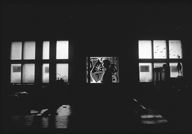Koryu: Southern Women, South Korea
 KOREA / 2001 / Korean, English / Color / Video / 75 min
KOREA / 2001 / Korean, English / Color / Video / 75 min
Director: soha
Photography: Park Ki-ung
Editing: Seo Young-suk
Sound: Kang Bong-sung
Music: Chang Jaeho, Lee Yunkyung
Producer: Shin Hye-eun
Associate Producer: Byun Young-joo
Production Company: Docu-Factory Vista
Supported by Korean Film Commission
Film Promotion Fund 2000
Source, World Sales: Mirovision Inc.
7Fl.45-18 Youido-dong, Youngdeungpo-gu
Seoul 150-010 KOREA
Phone: 82-2-737-1185 Fax: 82-2-737-1184
E-mail: sandy@mirovision.com
URL: www.mirovison.com
A complex multi-layered film about women of various ages and backgrounds living in “koryu,” or temporary residence. Memories of the filmmaker’s grandmother, talented in writing, who moves to an alien town on the South Sea after her husband defects to North Korea; a middle-aged Chinese woman who runs a small restaurant in South Korea; a Korean artist and gallery owner whose husband is British, and a young woman who dreams to become a filmmaker. Brief interviews are interlaced with long wondrous travelling shots—perhaps representing a journey, through the corridors and spaces women have dug for themselves under the oppressive order of Confucian patriarchy. Feminist film critic soha returns to filmmaking after nearly ten years in academia.
[Director’s Statement] Koryu: Southern Women, South Korea is composed of three parts delivered in several long traveling shots that embrace exterior space, often visited by sudden rain and fog, and interior space cluttered by embroideries and old furniture. My concern in Koryu is to see how women of three generations in the southern part of Korea inhabit their time, space and culture in the “koryu” way. “Koryu” refers to a temporary residence in an alien land. The film also looks into the way pre-modern and modern women articulate themselves through different modes of expression. For instance, the women in Southern Kyongsang province are allowed to compose and read funeral notes for their deceased parents in Korean, because the use of Chinese is permitted only for men. This feminine form of funeral notes is called onmun chaemun (onmun is a reference to the Korean text in contrast with the Chinese text, chaemun). During the pre-modern days of the Chosun dynasty, this provided a rare and significant occasion for a woman to engage in highly sophisticated linguistic performance in Confucian culture. Avoiding a direct documentary style, this film tries to translate the semiotic into sound and mobile images.
 soha
soha
Born in 1961. Professor in the Department of Cinema Studies at Korean National University of Arts. Also active as a feminist film critic in Korea. Winter Illusion (1985) was the opening film for the 1996 NYC Asian-American International Film Festival and also screened at Women in the Director’s Chair in Chicago and at Invisible Colours in Vancouver in 1998. Little Timemaker (1985) screened at the 1997 NYC Asian-American International Film Festival. Other films include I, Text (1986), Blue Requiem (1987) and Even Little Grass Has Its Own Name (1991). |
